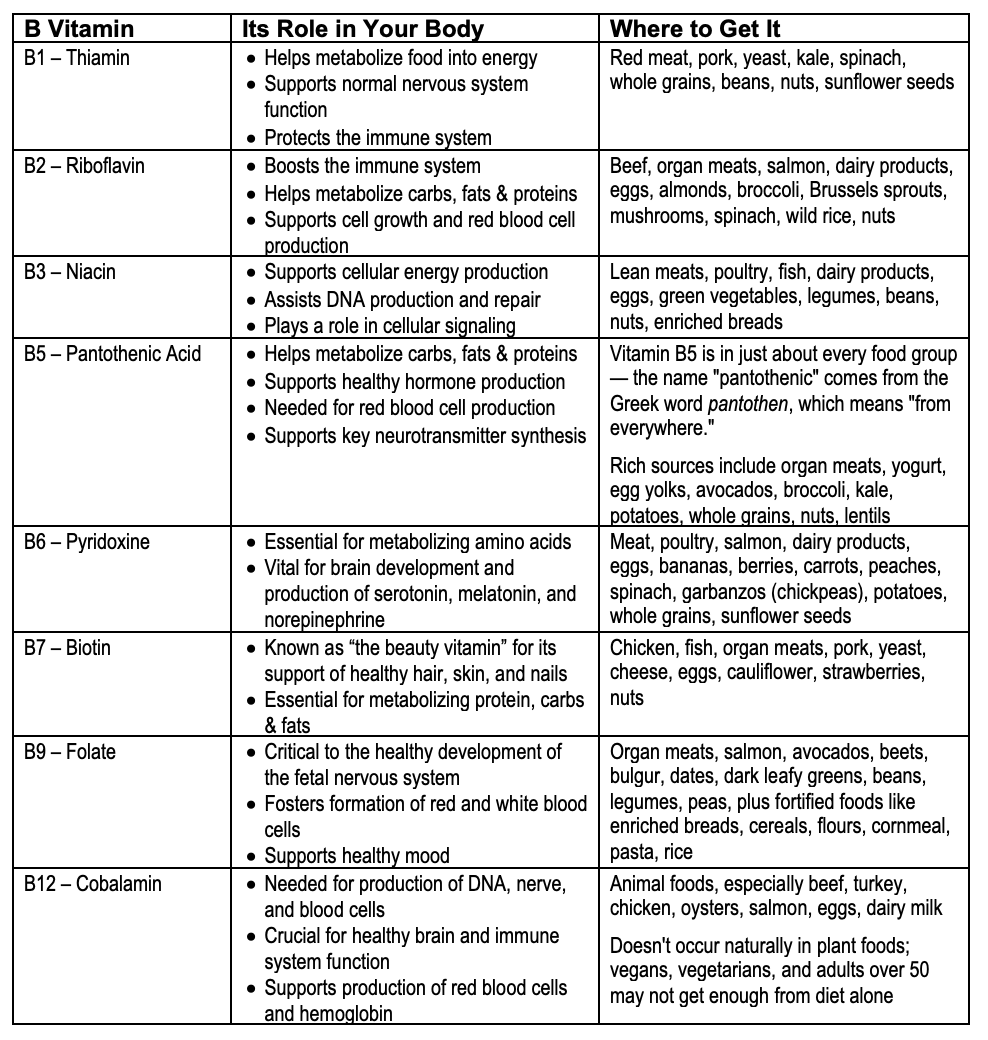
Good nutrition is the key to good health. That’s especially true when it comes to the B-complex vitamins. Not one of these nutrients is a “B Team” player— each is absolutely essential to your health and well-being.
What Is the B Complex?
“B complex” is the term for the group of 8 of the known essential water-soluble vitamins (the other is vitamin C). Supplements that contain all 8 B nutrients are called “B-complex vitamins.”
The discovery of the B vitamins began in the early 20th century as scientists struggled to understand and prevent malnutrition. The compound they first called “water-soluble factor B” was eventually identified as 8 different nutrients; each was assigned a distinguishing number under the original “B” designation.
Modern research suggests that adequate levels of all of the B vitamins are vitally important to every cell in your body. Each B nutrient is unique, yet their roles are closely interrelated throughout a wide range of critical cellular reactions, including: brain and nervous system functions; DNA/RNA synthesis and repair; food metabolism and energy production; formation of blood cells; cell growth and division, and more.
The Benefits of B
B vitamins are involved in over 100 cellular reactions throughout the body; many of your body processes won’t work properly without them.

How to Get Enough B Vitamins
B vitamins are water soluble; your body takes what it needs and excretes any excess in your urine. They’re not stored well in the body (except for B12, which can be retained for a limited time), so you need to replenish your supply every day.
Most people could get adequate B vitamins from their diet, yet experts calculate that more than 40% of US adults don’t eat enough B nutrients. Stress—including unhealthy diet, smoking, drinking, shift work, illness, or travel—and other factors like age, pregnancy, medical conditions, genetics, and prescription medications can increase your body’s demand for Bs beyond the average. In such cases, taking a B-complex supplement can be a good idea.
The best time to take your vitamins depends on the type you’re taking—but for any vitamin, taking it at the same time every day will form a healthy habit.
- Water-soluble vitamins, like the B complex, absorb best on an empty stomach.
- Take them first thing in the morning, 30 minutes prior to eating, or 2 hours after a meal.
- Taking just one B nutrient for a long period of time may result in an imbalance with the other B vitamins; choosing a single supplement or good multivitamin that includes them all will ensure a healthy balance.
- Since any excess is excreted immediately, it’s unlikely that you’ll consume too much of any B nutrient through diet alone or by taking a B-complex supplement as directed. If you’re taking several different supplements, however, you’ll want to monitor your total intake of B-complex vitamins to avoid getting more than you need.
Resources
You might be surprised at just how vital B-complex vitamins are to your health. Learn more about them from the sources we consulted for this article.
David O. Kennedy, “B vitamins and the brain: mechanisms, dose, and efficacy—a review,” Nutrients, Feb 2016. Accessed 1/25/19.
David O. Kennedy, et al., “Effects of high-dose B vitamin complex with vitamin C and minerals on subjective mood and performance in healthy males,” Psychopharmacology, July 2010. Accessed 1/25/19.
James Lake, “B Vitamins Play Important Roles in Mental Health Care,” PsychologyToday.com, 9/22/17. Accessed 1/25/19.
Jennifer J. Brown, “8 Surprising Health Benefits of B Vitamins,” EverydayHealth.com, undated. Accessed 1/25/19.
Jillian Kubala, “B-Complex Vitamins: Benefits, Side Effects, and Dosage,” Healthline.com, 6/7/18. Accessed 1/25/19.
Kathryn Watson, “When is the Best Time to Take Vitamins?” Healthline.com, 4/25/17. Accessed 1/25/19.
Laura Nunes, “Do You Really Need All 8 B Vitamins?” BrainMDHealth.com, 8/21/17. Accessed 1/25/19.
Michael Colangelo and Russell Greenfield, “Dr. Weil’s Guide to B Vitamins,” 10/29/17. Accessed 1/25/19.
The Nutrition Source, “Three of the B Vitamins: Folate, Vitamin B6, and Vitamin B12,” Harvard TH Chan School of Public Health, undated. Accessed 1/25/19.
U-M Health Blogs, “Vitamin B-Complex,” Michigan Medicine Health Library, University of Michigan, 5/12/15. Accessed 1/25/19.





